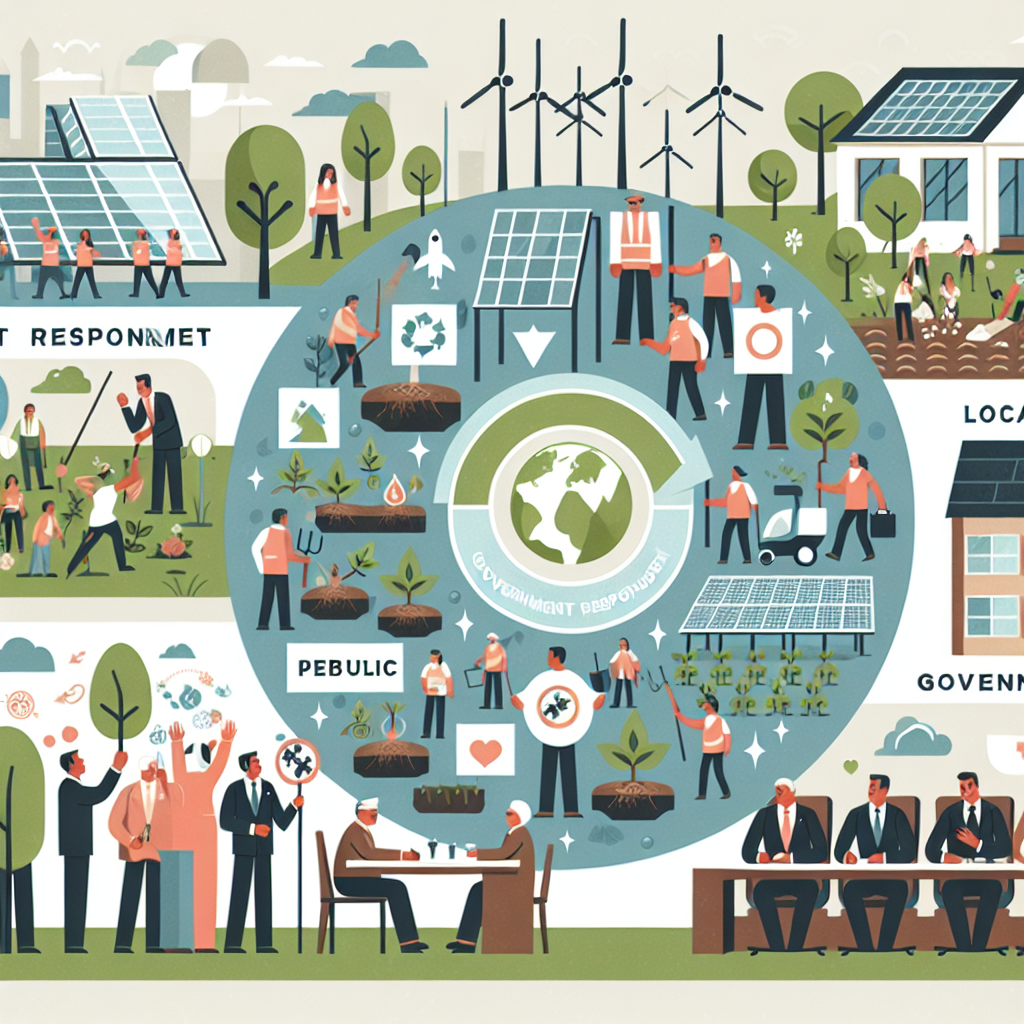
Climate Change Initiatives: Government Responses and Public Engagement
Climate change presents one of the greatest challenges of our time, directly impacting economies, ecosystems, and communities around the globe. The need for effective climate change initiatives is more pressing than ever. In 2025, governments and organizations worldwide are intensifying their efforts to combat climate change through policy formulation and public engagement. This article delves into these initiatives, outlining key government responses and the role of public participation in fostering a sustainable future.
Global Policy Frameworks for Climate Change Mitigation
The urgency to address climate change has spurred the development of several global frameworks aimed at reducing greenhouse gas emissions and promoting sustainability. The Paris Agreement, adopted in 2015, remains at the forefront of international climate policy, compelling countries to commit to emission reduction targets. By 2025, numerous nations have ratified their Nationally Determined Contributions (NDCs), which outline their specific climate action plans. This adherence not only reflects a commitment to global collaboration but also to achieving the ambitious goal of limiting global warming to below 2 degrees Celsius.
As we progress into 2025, initiatives like the Mission Innovation partnership are gaining traction, bringing together public and private sectors to accelerate public funding for clean energy innovation. Countries are also reassessing their climate policies to integrate more stringent carbon pricing mechanisms, facilitating a shift towards renewable energy sources. Notably, commitments by nations to phase out coal dependency are witnessing increased implementation, with significant investments in renewable technologies such as solar and wind.
National Responses: Policies and Legislation
National governments are crucial in shaping climate change initiatives through robust policy measures and legislative frameworks. In 2025, countries like the United States and several EU nations have enacted sweeping legislation that reflects their commitment to achieving net-zero emissions. These laws not only govern emissions standards for industries but also set ambitious targets for the transportation sector and infrastructure development.
Furthermore, innovative policies such as green job creation programs are gaining popularity. These initiatives aim to transition workers from carbon-heavy industries into sustainable fields, ensuring economic stability while advancing climate action. Governments are also working towards enhancing public transportation systems and urban infrastructure to reduce reliance on fossil fuels, positioning themselves as leaders in climate-responsive governance.
Local Initiatives and Community Engagement
At the local level, cities across the globe are implementing their climate action plans, tailored to meet specific community needs while contributing to national goals. By 2025, many local governments have launched ambitious initiatives in carbon-neutral urban planning, including green building regulations and enhanced public transport systems. Communities are encouraged to partake in sustainable practices through incentive programs that reward energy-efficient behavior, such as retrofitting buildings or adopting electric vehicles.
Moreover, public engagement in local climate initiatives has proven essential. Local governments are hosting forums and workshops to educate residents about climate impacts and resilience strategies. Collaborative projects involving community members not only build awareness but also foster a sense of ownership and responsibility towards sustainability efforts. The integration of indigenous knowledge in local environmental policies has enhanced biodiversity conservation, proving that sustainable practices can be made more effective through community collaboration.
The Role of Non-Governmental Organizations (NGOs)
Non-governmental organizations (NGOs) play a vital role in climate change initiatives by advocating for policy change, mobilizing public support, and providing critical research and resources. In 2025, NGOs have become key players in filling gaps left by bureaucratic processes, acting as watchdogs, and ensuring that governments adhere to their commitments. Organizations are leveraging their platforms to raise awareness about climate issues through social media campaigns, public demonstrations, and educational outreach.
In addition, many NGOs are working in partnership with governments to implement on-the-ground projects, such as reforestation efforts and community clean-up events. These collaborative efforts showcase the importance of multi-stakeholder engagement in executing climate initiatives that achieve tangible results. NGOs are also pivotal in helping vulnerable communities adapt to climate change, offering support for disaster preparedness and resilience-building programs that empower communities to face environmental challenges.
Mobilizing Public Sentiment: The Power of Collective Action
Public engagement is indispensable for the success of climate change initiatives. Citizens worldwide are becoming increasingly aware of the urgent need to address environmental issues, leading to a surge in grassroots movements advocating for climate action. By 2025, campaigns led by youth organizations and activists have mobilized millions for climate strikes, directly influencing policymakers and pushing for stronger regulations against climate change.
Engaging the public through innovative platforms, such as digital petitions and virtual town halls, has increased accessibility and participation in climate discourse. Social media has served as a powerful tool for spreading awareness and connecting like-minded individuals, fostering a global consciousness regarding climate change and justice. By prioritizing inclusivity in public climate discussions, marginalized communities are given a voice, ensuring that their unique challenges and insights are acknowledged in policy solutions.
Public sentiment, spurred by advocacy and education, can lead to significant changes in consumer behavior and lifestyle choices, ultimately accelerating the transition to sustainable practices. In 2025, the growth of eco-conscious consumerism signals a shift in the economic landscape, encouraging businesses to adopt greener practices and products, proving that public engagement can drive corporate responsibility.
Innovative Technologies and Climate Change Solutions
The intersection of technology and climate action has opened new avenues for innovative solutions to tackle climate change. In recent years, advancements in renewable energy technologies, such as solar panels and battery storage, have dramatically decreased costs, making them more accessible to households and businesses. Governments worldwide are incentivizing the adoption of these technologies by providing tax credits, grants, and rebates, leading to an exponential rise in their usage by 2025.
Additionally, digital tools and data analytics are enhancing monitoring and reporting on climate initiatives. For instance, satellite technology is being utilized to track deforestation and agricultural practices, offering invaluable insights for governments and researchers. The development of smart grids and the Internet of Things (IoT) enables efficient energy management, reducing consumption and optimizing renewable energy use. As technology continues to evolve, it plays a critical role in facilitating adaptation and resilience strategies to combat climate impacts.
Innovative approaches, such as carbon capture and offsetting, are also gaining traction. Companies are implementing strategies to neutralize their carbon footprints through investments in reforestation projects and other sustainable practices. Public awareness of these technologies and their importance in mitigating climate change results in greater support for research and development in the field, emphasizing the synergy between government policy and public engagement.
Conclusion
In summary, the fight against climate change is a multifaceted endeavor that necessitates cooperation from governments, communities, NGOs, and individuals. By 2025, a plethora of climate change initiatives are underway, showcasing diverse strategies that address both local and global challenges. While significant progress has been made in reducing emissions through legal frameworks, local engagement, and technological advancements, the road ahead remains fraught with challenges. Continued advocacy for policy change, coupled with active public participation, is crucial for nurturing resilience against climate impacts. By fostering collaboration across sectors, we can turn aspirations for a sustainable future into tangible reality.
FAQs
What are the most effective government responses to climate change?
Effective government responses include implementing stringent emission regulations, investing in renewable energy, and developing comprehensive climate action plans that integrate community engagement and individual behavior changes.
How can individuals engage in climate change initiatives?
Individuals can engage by participating in community clean-up efforts, advocating for sustainable policies, and adopting eco-friendly practices in daily life, such as reducing waste and conserving energy.
What role do NGOs play in combating climate change?
NGOs educate the public, advocate for policy change, and partner with governments to implement local climate projects, thus acting as essential allies in the fight against climate change.
Additional FAQs
What impact does climate change have on biodiversity?
Climate change significantly affects biodiversity by altering habitats, disrupting ecosystems, and leading to the extinction of vulnerable species as they struggle to adapt to rapidly changing environments.
Can technology truly help in the fight against climate change?
Yes, technology can provide innovative solutions such as renewable energy, smart grid systems, and carbon capture methods, all of which play a crucial role in reducing greenhouse gas emissions and promoting sustainability.
By focusing on collaboration and the integration of groundbreaking technologies, society can achieve significant milestones in the fight against climate change, ensuring a sustainable environment for future generations.
Democracy versus Autocracy: A Global Perspective
16. Dezember 2025The Impact of Sanctions on Global Trade Dynamics
16. Dezember 2025Geopolitical Tensions in the South China Sea
16. Dezember 2025
Leave a reply Antwort abbrechen
-
Diversity in Baseball: Progress and Challenges
11. Dezember 2025 -
Rookie Standouts: NFL Predictions for First-Year Players
3. Dezember 2025





